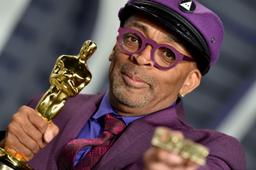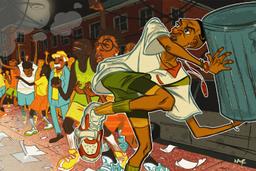“Let me ask you a question,” Spike Lee hollers at me over Zoom, from his production office in a Fort Greene brownstone. “When you hear the term ‘blood money,’ what do you think? What comes to mind?”
The 68-year-old director leans back in his chair like a sultan on a swiveling throne, and a fastidious backdrop comes into view: At least 32 pieces of framed artwork, photos, and posters for movies—some of which are his, some of which aren’t—complement a hodgepodge of priceless sports memorabilia relics. The filmmaker wears a matching black Breton cap and tee, a pair of arctic-white glasses, a wrought silver necklace, and some earrings to boot. We’re trying to crack open his newest movie, Highest 2 Lowest, an internet-age record-industry melodrama ensconced in a zany police procedural, that debuted in theaters on August 15. (It’ll hit Apple TV+ Labor Day weekend.)
I lob back a few word associations for his “blood money” question: “Diamonds. Oil. High-key, sugar.”
Lee nods his head and says very little, only bearing a slight grin. He’s not about to fully unwrap the moral quandary at the center of the new flick, but he’s got no problem picking at it.
“All money …” he schooled me earlier on the call, “... ain’t good money.”
Set in Lee’s native Brooklyn, Highest 2 Lowest is a reimagining of High and Low, Akira Kurosawa’s 1963 Yokohama-set whodunit. Lee’s 25th feature film, the movie reunites him with Denzel Washington for the first time since 2006’s Inside Man—the longest interim in a virtually unrivaled creative partnership that dates back to the early 1990s. Over 133 minutes, their latest outing follows the unraveling, descent, and awakening of David King, a music executive who ends up on the wrong end of an extortion and (partially successful) kidnapping plot. As slick and charismatic as ever, Washington renders the protagonist with a slippery, flawed aplomb. It’s a slow burn of a movie—costars include Jeffrey Wright and the sometimes-rapper A$AP Rocky—but when it hits its groove, it’s effortlessly fun.
There are feats of photographic acrobatics (see: a nifty French Connection–inspired subway chase interspersed with footage of Puerto Rican salsa master Eddie Palmieri, who died earlier this month). A rollicking buddy-comedy interlude (at one point, Wright and Washington cruise uptown in a Maybach with Glocks in tow and James Brown tunes in the deck). Even a lithe little rap battle (where the elder mogul starts quoting Nas to Rocky, a real-life Harlem-born MC). Despite—or maybe even directly because of—its glossy artifice and tech-distributed come-up, Highest 2 Lowest is as much devoted to reconciling Black celebrity with Black artistry as it is about wealth, family, or industry.
For Lee, the movie marks something of a ruminative occasion. It’s been 39 years since his groundbreaking polyamorous debut, She’s Gotta Have It, dropped. In the time since, he’s watched Hollywood swallow and regurgitate its tail multiple times, been stepped over by lesser works and tarred with specious sociological phenomena, and inspired a generation of filmmakers to follow his path, fitting themselves through American entertainment ramparts. At one point, I ask Lee who his intended audience is at this stage of his career, even with this kind of a platform. He smirks, lets his eyes do the heavy lifting. The godfather of Black filmmaking is both a priceless honorific and a form of confinement.
“I make movies for everyone,” he tells me. “For everyone.”
Despite the gray stubble, countenance-wise, he’s still more Mars Blackmon than old guard. At one point Lee gets up from his chair, grabs a pencil-brown Louisville slugger from the back of the room, shows me Willie Mays’s signature on the bat, and gives the barrel a little kiss as tribute. More than once he bellows that signature cackle (followed by a full-body lean out of frame) and unleashes a punctuation mark of a shout. When I ask whether he’s got more Denzel collabs up his sleeve, Lee says he “hopes so,” but he’s happy enough giving thanks for the rest of their oeuvre—“I’m just thinking about the work we’ve done.” Four decades in, the Great American Director’s circumstances might’ve changed, but Spike’s still hell-bent on always doing it right.
Denzel mentioned that y'all think of your art together as a partnership. You're not the first director to partner with some of the same actors repeatedly. Shit, Kurosawa did it with Toshiro Mifune. Scorsese did it with De Niro. Lumet did it with Pacino.
I think Kurosawa and Mifune did it 16 times. Me and Denzel not getting 17. I'd be blessed if we get to no. 6.
What goes into solidifying those relationships? Is it reps, is it trust? You tell me.
There's two things. I mean, the foundation—we're talking about the basic foundation—between Denzel and I is love and trust, trust and love. Everything's been built upon that. We both agree on that; there's no disputing about that. If you do that, you're free because everything that’s done is for the film. So then we're never going to feel any type of way about each other because we want what's best. Denzel said—because he’s been asked, “Why you call Spike?”—and he’s said, “I love and trust Spike.” That was it. “I knew that he knows New York City.”
Denzel is the one who first approached you about this film, correct?
Yeah, the script had been going around for years. Ended up in Denzel's hand, and he called me up. I didn’t even recognize the phone number. And he said, “I got this thing. I want you to read it and let me know what's happening.” He said, “Imma send it to you FedEx.” I said, “Bet,” and before I hung up the phone, I knew I was doing it. Just the opportunity, man—it wasn't till later that I found out the Inside Man was 19 years before. And Denzel and I did not even know that. We did not think that much time had expired.
He didn't have to call me, he didn’t have to. Denzel don't have to toss or turn at night about who he’s going to call. But over the years, we laid the groundwork. We see each other. He has season tickets, way before me, with the Lakers. And so every time the schedule comes out for a new season, I look to see when the Knicks are going to be [in L.A.]. And he sees when the Lakers are going to be at the Garden. So really that's been, within the space those years we had not worked, it's really going to the basketball games together in L.A. and New York [that kept us close].
A couple years ago, I had the pleasure of talking with George Clinton. Followed him around the whole day. Shit was amazing.
P-Funk!
Yessir. And he said something to me about how he viewed himself as an artist. He said that as a band leader, he thought about himself as a director. That his greatest skill was figuring out how he “can get it out of people—even what they don't know they got.” Does that resonate with you as a filmmaker?
That's a very good question. I got to give a shout-out. How old is George now?
He’s 84. He just went on tour again.
Well, he got that good stuff!
[Spike starts chortling.]
[Still chortling.]
My brother got that good stuff.
Man, he hotboxed this van while I was interviewing him. Mercedes Sprinter. Every window, vent—everything shut. And I have not been this high since I was 16 years old.
He's been had the connection! And shout-out to the Godfather of P-Funk. For me, my job—and again, you know that I love sports—is I'm the head coach. I'm the manager. So I have to know who I'm working with. You gotta learn what works with those individuals you have. People are built different. My approach with Denzel is like, I'm Phil Jackson and he's Jordan. So do whatever you want to do. He’s a genius.
But some other people, they don't got that. “Eh, come here for a second.” So I've been fortunate to work with great actors, but at the same time, everybody's not Denzel or Jeffrey Wright or Ruby Dee or Ossie Davis or Harry Belafonte. You have to know who your actors are in the same way a manager, a head coach has to know who's on the bench. And all that is for the purpose to win. That W.
A few weeks ago, you said the following about Highest 2 Lowest in another interview: “This film is about morals and what someone will do and won't do.” This was in reference to the protagonist, David.
Not just David. I mean, that goes for Yung Felon [Rocky’s character], too.
What I’m wondering is: If you, Spike Lee, are in David's shoes—what are you doing?
Who's who got captured?
[Spike commences more chortling.]
Are we talking about friends or family? ’Cause family … but some other motherfuckers? What are the kidnappers asking for? What's the ransom? Some motherfuckers, I don't know. They might not make it. I'm not talking about blood.
You’re saying Spike Lee has a line.
Here’s the thing: The novel that Kurosawa originally adapted is called King's Ransom by an American novelist named Ed McBain. So we want to talk about the source [of all this]. Kurosawa adapted the novel portion, and the play upon morality is in the novel. And then Kurosawa took it up to another level. When you have an actor like Denzel Washington and the dilemma he's in, Denzel has the power to put the audience members in his shoes.
So when they see this film—because of the great power of Denzel Washington—they've been transported. And what they've seen in the film, they are experiencing. They ask themselves the question “What would I do if I was put in this predicament?” And there's not going to be one answer. Some people make the choice that they're going to pay the ransom. Other people say, like, “Fuck that.” And they're like, “I need that money. I saved this money.”
That's what makes it interesting for me. People are always going to have their own reaction to the predicament that David King is in. Other people would be like, “Yo, fuck you, man. I ain't paying that motherfucker.” There are people who’ll do anything for money, put their mother on the corner for money.
All right, let me give you three or four rapid-fire Qs.
I'm ready.
Most misunderstood film of yours.
Bamboozled.
That was where I was leaning. Why?
People can't deal with the truth. People can't deal with that montage at the end. The history-herstory of Blackface [throughout] the history of cinema. From the jump. From silent films. The industry from the giddy-up, from the beginning. Non-talkies—Black folks were dancing and all type of stuff.
Back in ’87, when asked about the dearth of Black filmmakers, you told the press, “I'm tired of people who know nothing about us defining our lives.” Now, I know there are far more Black filmmakers who've been able to find some semblance of a path in the industry since then. Folks indebted to your own climb. As someone who has seen multiple incarnations of the industry, do you feel like “people who know nothing about us” are no longer in a position to define our lives?
The people who “know nothing about us” are [still] in those positions. They still choose what gets made and what doesn’t get made. So I continue to think that maybe the answer to that is a continuation of independent cinema, where you're not necessarily relying on the structure to make the films, but use that structure to get your films distributed.
You think of yourself as an outsider still?
Well, I don't live in Hollywood. Let's leave it at that.
You on the Vineyard right now, or are you in New York?
The People's Republic of Brooklyn, New York. Fort Greene. The world headquarters of 40 Acres and a Mule.
Let’s go politics. What comes to mind for you when you hear about Trump's executive orders mandating “a patriotic education” and attempting to censure any historical narratives that “disparage Americans past or living”?
It’s a complete whitewashing of American history. And a total—what do you call it when somebody takes your memory? If it was left up to him and his so-called attack on so-called wokeness, enslavement [apparently] never happened. Our ancestors just miraculously showed up here from Mother Africa, and we got paid a wage for building this country. Working from can’t-see in the morning, to can’t-see at night, and forever shall be enslaved.
Give me your favorite filmmaker under the age of 40.
How old is Ryan [Coogler]?
He might be just under the age of 40. I'll give you a pass, if not.
Hold on. Look it up?
[Someone off-screen: “39.”]
Thirty-nine. Look at that. You put the age limit, so I snuck in there.
Do you still ride the subway?
Oh, yeah.
You riding the 2 and 3? The A and the C?
I'm not giving that up now [laughs]. When I get on the subway, I just put a hand on my hat, pull it down.
I can picture that. OK, is Aaron Judge the best hitter you've ever seen?
Look, I'm partial. And I mean, growing up on Willie Mays—see that suitcase right there?—that's Willie Mays’s suitcase from the last year the Giants were in New York, 1957.
[Spike rises from his seat and waddles over to the corner of the room. He comes back toting a bat that’s half his height.]
And this is Willie Mays’s game-used Louisville Slugger, signed.
Oh, that's a holy relic, man. That's sensational.
And I love Aaron Judge. But call me an old-head. Here's the thing that amazes me growing up in Brooklyn: Mays, Ali, Walt Frazier, and Namath—these are my boyhood heroes. And then later on, many years later, I got to meet these people, these heroes of mine. And they're naming scenes [from] my films, man. I mean, Ali? Willie Mays? Joe Namath? Walt Frazier? It's something when you are a kid and you idolize whoever it is, but then you get to meet them when you are an adult and they know who the fuck you are. It’s great.
OK, last one. You lose three fingers, but the Knicks win it all.
Where's a knife? I said I’d give up an Oscar. I don't need them—as long as it’s not the thumb. I need two thumbs. I’m left-handed. So take three fingers from the right hand. I still won't be able to sign them checks.
This interview has been edited for length and clarity.


